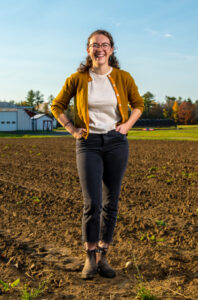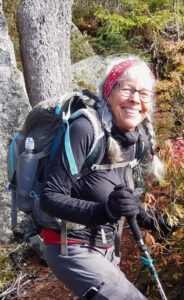2020 Mitchell Center Sustainability Awards
Mitchell Center Sustainability Awards have been presented annually since 2013. The awards are designed to recognize and celebrate the accomplishments of researchers, students, and external partners who have helped advance the values and principles at the heart of the Mitchell Center’s stakeholder-engaged, solutions-focused, interdisciplinary projects and partnerships.
Thank you to all who have participated in the awards process this year and congratulations to all awardees!
Outstanding mentorship of a student or other team member in sustainability research
 Carly Sponarski, Assistant Professor, UMaine Department of Wildlife, Fisheries & Conservation Biology
Carly Sponarski, Assistant Professor, UMaine Department of Wildlife, Fisheries & Conservation Biology
In her work, Carly Sponarski brings together the social and ecological aspects of natural resource management—not just how ecosystems and species function and interact, but also how people are directly and indirectly involved.
Carly’s nominators note her “selfless dedication” to mentoring both students and faculty collaborators. “After working with Carly on an interdisciplinary research project (on Atlantic salmon governance), it is clear that she deserves to be recognized. When we began this project, we were both new to social science and Carly had the expertise—and the patience—to help us navigate the complexities of working with key stakeholders within a new investigative framework. She introduced us to the expansive scope of human dimensions research and went above and beyond to ensure the success of our joint research endeavor. Her mentorship style fosters a collaborative approach which has allowed us to grow as researchers while instilling the fundamental tools needed to conduct sound and reliable research.”
“Thank you to my nominees and to the Mitchell Center,” Carly says. “Mentoring students and collaborating with people is one of my favorite parts of the work, and I cherish this recognition.”
See a short video of Carly expressing her appreciation for the award here.
 Outstanding student contribution to sustainability research
Outstanding student contribution to sustainability research
Sara Kelemen, UMaine master’s student, School of Food and Agriculture
Sara is a first-year master’s student in sustainable agriculture who worked with the Mitchell Center in 2020 to advise the Maine Governor’s Office of Policy Innovation and the Future on equity outcomes of the state’s Climate Action Plan. She is also conducting research on two innovative sustainability projects, on the influence of corporate education programs on regenerative agriculture practices, and on a novel payment system for ecosystem services across the U.S.
Sara’s nominator notes that through these projects, “she has demonstrated her considerable capacity to work across stakeholder groups in pursuit of sustainability solutions.”
Working with collaborators on the climate equity project, “Sara reviewed efforts undertaken in other states and municipalities, and applied these lessons to recommendations submitted to the Maine Climate Council. Her work detailed how vulnerable communities bear a disproportionate burden because of climate change, and how state programs should be adjusted to be more inclusive. Sara and her collaborators presented the final report to multiple audiences, including the Maine Climate Council, and as part of the Mitchell Center Sustainability Talks series.”
Sara says, “I hope that the work I began over the summer will provide the foundation for creating a Maine future in which those who are most vulnerable to the effects of climate change will have a strong and respected voice in framing climate conversations and solutions.”
 Outstanding contributions toward the development of a solution by a researcher or research team
Outstanding contributions toward the development of a solution by a researcher or research team
Esperanza Stancioff, Extension Professor, UMaine Cooperative Extension and Maine Sea Grant
“Esperanza has worked tirelessly to implement solutions for climate resilience in Maine’s coastal communities for decades,” her nominator says. “Her recently funded project through the Mitchell Center has enabled her to work with a team of faculty, researchers, and students from UMaine, UMaine Machias, Bowdoin College, and the Maine Department of Environmental Protection to engage public officials to establish immediate and long-term needs for climate adaptation in their communities.
“The work is building connections with the efforts of the Maine Climate Council and the Climate Change Adaptation Providers Network, and among communities. … [It] is poised to empower communities to face problems and implement solutions to address issues such as sea level rise, storm surge, and flooding, and serve as a model for actions to implement the recommendations of the Maine Climate Council.
“In the face of a changing climate, our coastal communities face issues of local capacity including scarce resources for implementing projects and a lack of technical expertise to oversee strategic planning and implementation,” Esperanza says. “It has been an honor to work in Maine’s coastal communities to promote coastal resilience, and to engage with the Mitchell Center and associated colleagues on climate change adaptation efforts.”
Outstanding contribution by an external partner to sustainability research
 Center for EcoTechnology
Center for EcoTechnology
Cory Mansell, Strategic Services Representative
The Center for EcoTechnology’s mission is “to research, develop, demonstrate and promote those technologies which have the least disruptive impact on the natural ecology of the Earth.” The organization is home to nationally renowned experts in food waste reduction programs for public and private entities.
“Cory Mansell has so generously shared contacts, insights, and time to help the Mitchell Center in its efforts to end food waste in Maine,” the Center’s nominator notes. “Their support has included helping to train each new food waste project intern, providing review and guidance on all our research and programs, and supplying strategic connections–all of which have allowed our final food waste solutions and pilots to be ‘best-in-class.’”
“As an organization, CET prides itself on being a neutral source of information that provides businesses and institutions with the tools to maximize wasted food reduction, donation, and diversion,” Cory Mansell says. “We work to gain a comprehensive understanding of both the solution providers (haulers, composter sites, food rescue organizations, etc.) in the market, and the needs of specific businesses.
“It has been a pleasure working with the Mitchell Center to identify pilot solutions to reduce and end wasted food in Maine. Work like this will have an impact and pave the way to a more sustainable future.”
